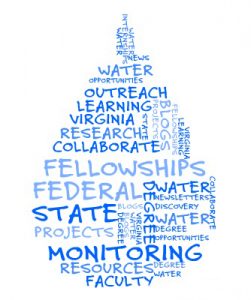Current Research Topics by Faculty at the Water Center

The Water Center thrives on participating in inter-disciplinary research ventures. Many of our ongoing projects bring together faculty, researchers and graduate students from a variety of academic disciplines to conduct water-related studies. Other Water Center initiatives partner with government agencies and non-profit organizations to meet shared goals in the water arena.
Following are overviews of current and recent Water Center projects. Unless noted otherwise, contact the Water Center at water@vt.edu for more information on these projects.
Wetlandscape Functions. Investigating the many ways that spatially distributed wetlands provide functions at local to landscapes scales.
Drivers of Headwater Stream Condition, Dynamics, and Connectivity. Investigating the spatial and temporal behavior of headwater stream networks and quantifying the impacts of watershed activities on water quality, habitat integrity, ecological function, and regulatory significance.
Managing Forests for Water Resources and Water Quality. Understanding the role of forest management and conservation in supporting regional water resources and evaluating how forestry practices affect sediment delivery, water quality, water yield, and aquatic ecosystem health in forested watersheds.
Hydrologic Conditions that Support Threatened Species. Assessing the controls of hydrologic regimes and associated habitat conditions for threatened and endangered species.
Water Movement and Residence Time in Watersheds. Understanding how water moves through and is stored in landscapes using stable isotope tracers, with implications for water quality, nutrient cycling, ecosystem processes, and recovery from pollution and disturbance.
Soil-Landscape-Hydrology Interactions. Linking soil characteristics and landscape position to water flowpaths, storage, and streamflow generation processes.
Watershed Response to Environmental Change. Assessing how climate variability, land use change, urbanization, disturbance, and management practices affect hydrologic processes, water resources, water quality, and ecosystem function.
Water, Sanitation, and Hygiene (WASH). Assessing water access, water security, and the effectiveness of point-of-use treatment at the household and community scales.
Water-Disaster Nexus. Investigating and leveraging pre-disaster mitigation and post-disaster recovery as opportunities to increase water infrastructure resilience and address inequities in water services.
Restoration and Ecosystem Recovery. Studying methods for restoring ecosystem function and implementing monitoring programs to assess restoration effectiveness.
